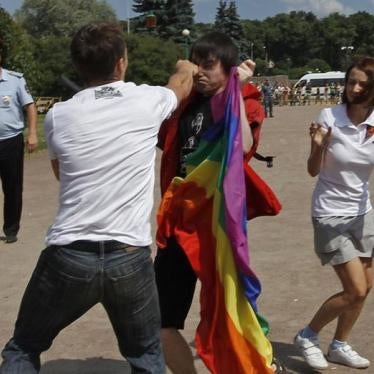The Winter Olympics are almost upon us but it feels like Sochi has been stirring debate for months. The games open on February 7 and like all Olympics will be a showcase for great sporting achievements. However, during preparations the Sochi Olympics have been defined by serious human rights abuses, cost overruns and corruption not to mention Russia’s anti-Lesbian Gay Bisexual and Transgender law and its shadow over the games as well as security concerns.
The Olympic spotlight highlights broader trends too. Today’s globalised media are attracted to such world events and the stories they tell. As the current roll call of politicians who will or will not be in Sochi shows, such global events also have political ripple effects far beyond the host country. Then there’s the way the undemocratic bodies that run such events – in this case the International Olympic Committee – try to maintain an iron grip on the increasingly complex proceedings, despite the evident need for more transparency and cooperation with stakeholders.
And there is the growing role of advocacy groups like Human Rights Watch and others who document abuses caused by the Olympics and focus attention on the human impact of the games – including how limits on free speech and protest contradict the spirit of fair play under which the games should be held. That sport and politics cannot be separated seems truer than ever. Olympic history over the last century – from the Berlin Games in 1936 to the Beijing Games in 2008 – reveals that mega-sporting events are rarely apolitical. Sports people, politicians and sadly even terrorists have for decades used the platform offered by top-quality sport to score political points.
Yet in today’s networked world, this process is accelerated. In the human rights field, we are sometimes accused of ‘politicising’ the Olympics with our research and advocacy on behalf of migrant workers, local residents, and local activists in Sochi who have faced abuses and harsh repression. In reality, it’s the Kremlin playing the political and nationalist card with Russian President Vladimir Putin openly stating his hope that the hosting of the games will project a new image of Russia around the world. Yet such prestige does not come without responsibilities to host fair-play games in a political and human rights context that is also fair.
This is not just our view. The Russian government had the power and the obligation to ensure from the outset that construction workers were paid and treated properly; that homes in Sochi were not knocked down without the residents being compensated fairly; that the local environment was not damaged and that activists and reporters were not harassed for peaceful criticism. The Russian authorities’ decision not to do so has led to an avalanche of negative global media coverage, protests from those affected and from civil society and international diplomatic pressure.
The country’s leaders have in fact apparently felt enough heat to see it in their interest to act. The welcome release from prison before Christmas of high-profile detainees such as Mikhail Khodorkovsky and the Pussy Riot band members was attributed by many observers as a response – if a cynical one – by Putin to the danger of Sochi being overshadowed by negative headlines.
Similarly, the surprise announcement this month that Russia will be paying $8.3m in back-wages to construction labourers on Olympic sites in Sochi appears a direct response – although a partial and inadequate one – to international concern over blatant exploitation. It is not too late for headway on other policies that have marred the Sochi Games such as Russia withdrawing its anti-gay so-called ‘propaganda’ law. If this heightened interplay between politics and sport is the ‘new normal’ then what is the new rulebook to ensure the preparation for the Olympics is as fair as the games themselves and the positive purpose of such events is not devalued?
Both the host countries and the IOC have new tasks. For future hosts, Russia’s experience underlines that it’s increasingly difficult to dodge international attention on all aspects of the games. Hosts need to be clear from the bidding process onwards that in addition to fulfilling the IOC’s usual technical requirements, they will uphold basic human rights in their preparations for the Games and remedy abuses if they do take place. Sweden’s Olympic Committee and trade unions recently announced that fair labour standards would be part of the country’s 2022 Winter Olympics bid. Such an approach could be part of the way forward.
In Russia, despite warnings from others and us on the strong evidence of problems in Sochi’s preparation, the IOC failed to effectively intervene with the authorities to tackle issues such as abuses of migrant workers. On the propaganda law it continues to blithely accept Russia’s assurances that there will be no discrimination during the games – refusing to recognise that the law is discriminatory, contradicts the Olympic Charter and has contributed significantly to a hostile anti-gay atmosphere.
The shadow of these abuses over the Olympics shows that the IOC’s approach has not worked. A better strategy in the future would be to integrate human rights standards into the way the organisation operates, forming a standing committee on rights related issues including migrant labour, evictions, press freedom and ensuring free expression for those who want to protest or criticise; and integrating these issues into the bidding process and preparation for future games. If that happened, maybe we could finally concentrate on the sport.
Hugh Williamson is director of the Europe and Central Asia division at Human Rights Watch.







